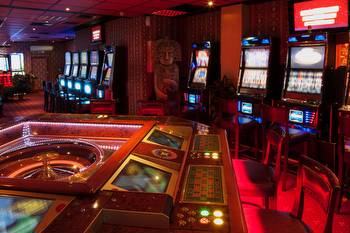Investing In Casinos And Online Gambling: Key Things To Know

The casino industry has been hit by two major developments in the last few years, the advent of online gaming and the emergence of the COVID pandemic. Both created serious challenges for the industry, but the year 2022 has seen the industry bounce back after more than a year of subpar performance.
Hospitality industries such as casinos suffered a dire situation in 2020 as COVID hit customers’ willingness and ability to travel. But with a vaccine and a rebounding economy, consumers have turned 2022 into the year they get back to normal. That attitude has made casinos into money machines, and the industry notched its third-best month ever (revenue-wise) in July 2022, according to the American Gaming Association. In fact, the American gaming industry is poised for a second straight year of record revenue, as of September, says the association.
And now online gaming, including online sports betting, is becoming more popular than ever following a 2018 legal change that has ultimately led to more states legalizing sports betting. With the change, emerging online gaming companies such as DraftKings and incumbent casinos’ online operations give them more ways to reach the betting public than ever before.
Gaming stocks to consider
The table below includes some of the largest players in the gaming sector, and the biggest operators tend to be focused on Las Vegas and more so on Macau, China:
Las Vegas Sands is squarely focused on its Asian operations, after selling its Venetian and Palazzo casinos in Las Vegas in 2022. Key Asian properties include the Venetian Macao, Four Seasons Hotel Macao, Sand Macao, Parisian Macao and the Marina Bay Sands in Singapore.
Caesars Entertainment operates about 50 properties around the U.S., with half of its cash flow coming from Las Vegas. Its key casino brands include Caesars, Harrah’s, Tropicana, Bally’s and Flamingo. It owns the U.S. portion of William Hill, an online sports betting platform.
MGM Resorts International operates some of the most well-known properties on the Vegas Strip, including the MGM Grand, Luxor, CityCenter and Mandalay Bay. But it also operates regional U.S. casinos as well as MGM Macau as well as sports and online gaming.
Wynn Resorts operates four luxury hotel-casinos, including the Wynn Macau, Encore Macau, Wynn Las Vegas and Encore Resort in Las Vegas. The company earns the vast majority of its cash flow from Macau and its expanding operations there. It operates Wynn Interactive, a purveyor of digital sports betting and online gaming.
PENN Entertainment operates more than 40 regional casinos in 20 states across the U.S. featuring traditional casino games. Through its interactive division, it runs sports betting and other online gaming. Through its wholly owned online unit theScore and a strategic partnership with Barstool Sports, the company also operates sports betting and digital media.
DraftKings operates fantasy sports, sports betting and online gaming, and creates software for sports betting and online gaming through business-to-consumer and business-to-business units.
Melco Resorts and Entertainment operates primarily in Macau with the Altira, City of Dreams and Studio City casinos, though it has City of Dreams casinos in the Philippines and Cyprus.
And if you’re looking to invest in sports betting, you have a few options here.
Expansion of legal online gambling
Online gambling has become legal across a handful of states over the last decade, while online sports betting has made a much bigger push across the country. The table below provides details on which states permit online casinos (a total of six) and online poker (a total of seven).
Sports betting is much more prevalent, and 32 jurisdictions, including Washington, D.C., permit it, according to LegalBettingOnline.com, though New Mexico allows only physical wagers, not online.
The expansion of sports betting has been quick, and happened in just the last few years. Before 2018, the Professional and Amateur Sports Protection Act of 1992 restricted sports betting to just a few states. In May 2018, the U.S. Supreme Court struck down that law, allowing each state the opportunity to adjust its own laws and make sports betting legal in its jurisdiction if it desired.
Potential returns in casinos and online gambling
How much should you expect to earn on your casino stocks? Well, that depends a lot on when you buy them, because they can be quite cyclical, falling faster than the rest of the market going into a recession and rising faster than the market when coming out of a recession.
For example, if you had purchased Las Vegas Sands on Sept. 15, 2017 and held it for five years, your total return would have been about -27 percent, factoring in dividends. However, if you had purchased the stock at the start of 2016 – just when the market was fretting about a broad economic slowdown, you could have sold it in December 2017 for 100 percent more.
It’s a similar story for Wynn Resorts and MGM Resorts, too. The cyclical nature of the industry can make life difficult for casino operators, who rely on strong tourism to thrive.
And what about DraftKings? As of September 2022, the once-hot stock has fallen below its $20 per share debut price in April 2020, all the way from a peak of better than $70 in March 2021.
But how have gaming ETFs performed? The performance might offer a broader-based look at the industry:
- The VanEck Gaming ETF (BJK) offered a total return of about -8 percent over the last five years, to Sept. 15, 2022.
Like the individual stocks, this fund showed considerable cyclicality over the last five years and longer.
So perhaps the best lesson for investing in casino stocks is to pick your spots, because the market can wipe away years of profit very quickly. If you don’t want to pick individual stocks, then going with one of the best ETFs may be an easier and safer way to go.
Investing in casinos and online gambling in a bear market
Owning casinos and online gambling in a bear market can be tough. Casinos are part of the consumer discretionary sector, meaning that consumers will often rapidly cut back their expenses during recessions or other economic slowdowns. Because casinos are not a “need to have” but rather a “fun to have,” their businesses can suffer significantly during a downturn.
And the profitability of a casino can drop even faster than its revenue does. That’s because these businesses require a high fixed-cost base to run. Workers have to staff the gaming tables whether customers come in or not, and extensive loans on the property (for example, for its hotel operations) mean that a casino always has bills to pay. On the flip side, when customers do return, the profits begin gushing, seemingly as if they’ll never stop.
For these reasons, it can be difficult to own a casino going into an economic slowdown. The stock market will anticipate the slowdown, too, meaning that it will be hard to beat the rush to sell your shares without taking a major write-down on your investment.
That said, when the recession begins to bottom, casino stocks may be some of the first to rally, even if there’s plenty of time left in the recession. And like other discretionary stocks, they may often bounce much higher and faster precisely because they’ve beaten down so much. So a proven casino operator may be a great place to invest over the next economic cycle.
However, in the subsequent recession casino stocks will fall again, repeating the cycle, meaning that casinos may be a better multi-year trade than a long-term investment.
Editorial Disclaimer: All investors are advised to conduct their own independent research into investment strategies before making an investment decision. In addition, investors are advised that past investment product performance is no guarantee of future price appreciation.






































